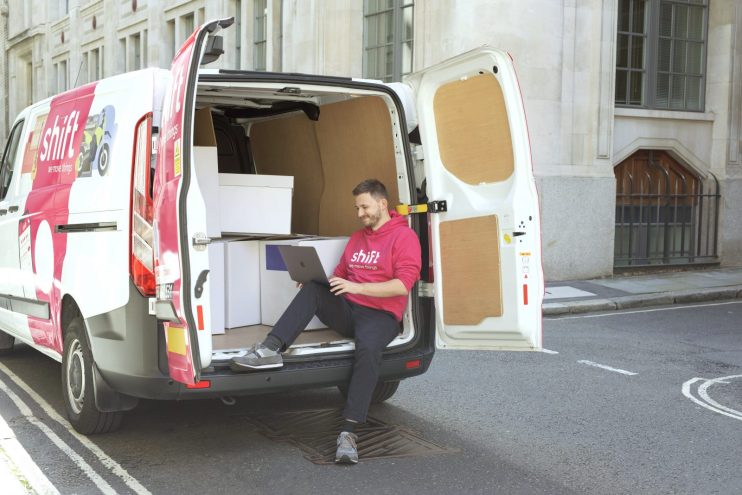Long read: Tech firm with big ideas looks set for Shift into higher gear

PICTURE the scene: a living room full of boxes, two flights of stairs and a hired van parked two streets away. After multiple trips – in both senses of the word – one is inclined to be a bit fed up. It’s the sort of moment that makes you wish somebody invented an easier way to shift a sofa.
Well, that may well now exist – and it could well become one of Britain’s most ubiquitous firms. The appropriately named Shift, founded by tech entrepreneur Jacob Corlett, sits on a similar plane as Ocado and Uber, using tech and data to turn an often painful process into a very simple one indeed.
Founded four years ago, in simple terms, Shift offers a very easy way to order a man and van service – on demand, and efficiently. The firm maps out drivers and fleets’ existing schedules, finding ‘dead time’, and matching it up with people who need to move stuff – be that a few boxes from the front room or Ikea, for whom Shift runs store-to-home delivery.
“We’re a tech company. Maybe logistics-tech,” Jacob tells City A.M. over a late afternoon coffee in the City.
“We don’t own a single vehicle. We’re totally asset-light, and we use technology to solve problems. The whole reason we’re able to do absolutely any time is because we’re aggregating thousands of drivers, which wouldn’t be possible without technology,” he continues.
ALL ABOUT EFFICIENCY
In short, the Shift platform matches up people who want to move stuff with people who are already moving stuff. A van driver who is already doing a run from Penge to Penzance might be able to grab an extra job from Tulse Hill to Tewkesbury. A couple more of those and suddenly you’ve a full van, an efficient route, and everybody still gets their stuff on time. Simple, really.
Investors like what they see, it seems. The firm announced £10m worth of funding early this year, including £1.3m from early-stage fund Fuel Ventures, and the impossibly young Corlett is clearly thinking big. The Ikea deal began as a pilot, but the Swedish giant soon saw the benefit of an on-demand, reliable service.
The idea of commercial partners had been percolating around the business for a while, but it was lockdown that pushed it forward.
Heading into the first outbreak of Covid-19 in 2020, Corlett tells City A.M. the firm was on the path to almost a million a month in sales.
Read more: Meet Shein: The secretive Chinese fast-fashion firm taking over online retail
“And then suddenly, the next month, it rocketed down to a fifth of that. People were cancelling, people can’t move home, retailers close their doors and can’t take orders. All of the different touchpoints that made the business work stopped,” he says. The odd ergonomic chair being shipped back from the office wasn’t quite the path Corlett had plotted.
Instead, Corlett focussed on strengthening the team and improving the tech behind the operation.
“We doubled down on making sure that we came out the other side of this 10 times better,” he tells me. And commercial opportunities grew.
“We’ve always been looking for partners and we’ve always had a partnership model. But the lockdown meant that I wasn’t running around trying to cope with the growth. Instead I was wondering what to do with my day – and it was contacting every major retailer.”
A BOLT-ON BONUS
Shift offered a win-win to retailers: taking the hassle out of logistics on delivery amid a massive increase in home shopping. Just as retailers did with bolt-on payment systems like Klarna and Clearpay, they saw Shift as an easy option to add on to their service – without the hassle of setting up themselves.
The partnership with Ikea began as a pilot within one store.
“Within three days they wanted to scale us out to two more stores. They were trying to solve problems – increased numbers of customers wanting to get things delivered when people can’t go to the stores.
“What’s great is that we’ve come out of lockdown and the consumer trade has come back.
The firm’s total customer base is around 250,000 consumer customers, and a few hundred business customers. There are more retailers in the offing, too.
Like all the best ideas, it seems the most simple of ideas. Corlett’s team is now at a hundred employees and there’s little reason to believe that won’t grow.
And with a scaleable platform and a universal problem – getting stuff from point A to point B – expansion abroad seems entirely feasible, too. Corlett’s a man with big ideas, and the tech to match it.
Read more: Editorial: From fireworks to business rates, it’s time to move forward